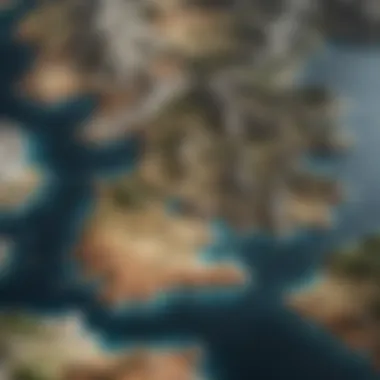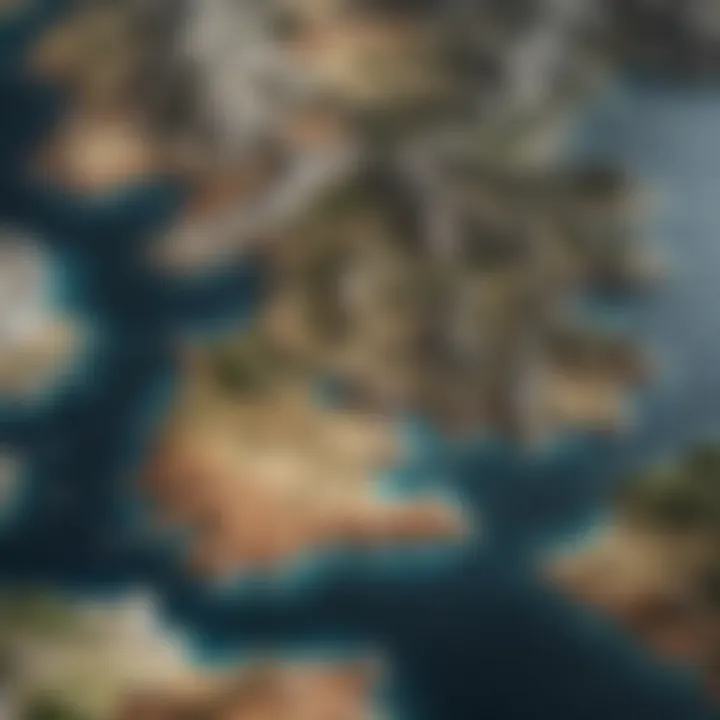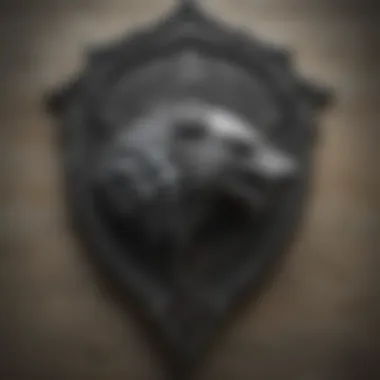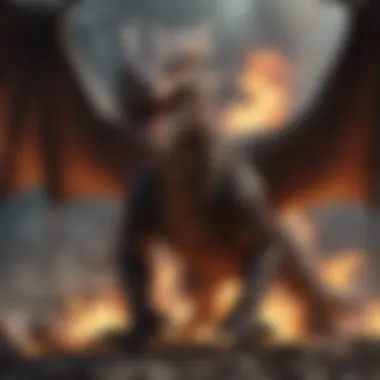An In-Depth Exploration of the Game of Thrones Series


Intro
The 'Game of Thrones' series, rooted in George R.R. Martin's vision of a complex, morally ambiguous world, has left an indelible mark on literature and popular culture. This series isn’t merely about high-stakes political intrigue or dragons breathing fire; it weaves tales of ambition, betrayal, and the quest for power. The intricacies of its characters and plots invite readers to traverse a landscape that feels at once familiar and otherworldly.
From the cold reaches of the North to the sun-soaked courts of King's Landing, each character holds a mirror to the human condition, reflecting our deepest fears, desires, and ethical dilemmas. With themes that resonate even beyond the pages, Martin's work compels us to ponder loyalty versus self-interest, the nature of good and evil, and the price of ambition.
In this in-depth analysis, we'll explore the characters who walk through this hauntingly beautiful yet brutal world, dissect their motivations, development, and the ultimate connections they forge with one another. Here's where we begin, sifting through the layers of narrative to unearth the richness that makes the 'Game of Thrones' saga captivating.
Preface to the Game of Thrones Universe
The Game of Thrones series is not just a collection of books; it's a sprawling tapestry woven from the threads of tension, ambition, and the stark realities of human nature. In this article, we aim to dissect the significance of this compelling universe, revealing how George R.R. Martin deftly layered an intricate narrative that resonates with both readers and viewers alike. The broader literary landscape has indeed shifted because of these works, and understanding this universe serves as an essential building block for appreciating the complexities that unfold across the pages.
Overview of George R.R. Martin's Works
George R.R. Martin, often deemed the "American Tolkien," goes beyond mere fantasy tropes to explore darker elements of politics and morality. His works are rich and deeply textured, pulling readers into a world that feels both real and fraught with peril. The A Song of Ice and Fire series, from which Game of Thrones derives, offers not only an epic storyline but also a vivid exploration of characters' motivations and their moral dilemmas.
Some key features of his works include:
- Multi-dimensional Characters: Not one character can be easily classified as a hero or a villain. Take a character like Cersei Lannister for instance; her twisted sense of loyalty towards her family often puts her at odds with her moral compass.
- Rich World-building: The detailed settings—from the icy North to the sunny Dorne—create a backdrop where political intrigue flourishes. Martin’s world isn’t merely a stage; it pulses with its own history and culture.
- Unexpected Twists: Readers are often caught off guard by unpredictable events, such as the demise of beloved characters. This willingness to defy convention keeps audiences on their toes, adding a layer of investment in the narrative.
This overview sets the stage for delving deeper into the plot, characters, and themes that have gained considerable attention over the years.
Transition from Literature to Screen
The journey from printed page to silver screen has made the Game of Thrones phenomenon a cultural touchstone. Fans of the books found themselves abuzz as HBO adapted Martin's work into a television series that aired from 2011 to 2019. This transition was paramount, transforming a relatively niche literary series into a global sensation.
Several considerations mark this significant shift:
- Expanded Audience: The show opened Martin's world to those who might never set foot in a bookstore, creating an entirely new fanbase that often flocks to online platforms like Reddit to discuss theories and plots.
- Visual Storytelling: The visual medium allowed for breathtaking depictions of places like King's Landing and the Wall. This stunning representation adds an extra layer, enhancing the reader's original imagination.
- Character Portrayal: While most character arcs remain intact, some adaptations have led to significant changes. For instance, the character of Jaime Lannister experiences a different trajectory in the show compared to the books, stirring debates about fidelity to the text.
This transition has markedly influenced both the literary world and the sphere of televised storytelling, cementing Game of Thrones as a landmark title in contemporary fiction and popular culture.
A Game of Thrones
The first novel in George R.R. Martin's series is where the journey begins. This book is pivotal, setting the tone and foundation for the entire saga. It introduces readers to the rich and, at times, brutal world of Westeros, where families feud, alliances are brittle, and the quest for power often leads to treachery. The importance of this section rests not just in its plot but in its ability to immerse the reader in a vividly detailed universe filled with political intrigues and morally complex characters.
Plot Summary and Key Themes
A Game of Thrones starkly portrays the conflicts that emerge from the struggle for power. Its characters are flawed and relatable, making their journeys engaging for readers. The themes woven through the narrative provide a granular understanding of ambition, loyalty, and the consequences of betrayal.
Conflict between Houses
The Conflict between Houses is central to the narrative of A Game of Thrones, heavily influencing the relationships and destinies of the characters. Each house, whether Stark, Lannister, or Targaryen, embodies unique ideologies and values, contributing to the broader tale of power struggles.
This conflict is marked by intense rivalries and shifting allegiances that keep readers on the edge of their seats. One key characteristic of these house rivalries is their relentless brutality, capturing the raw stakes involved in the quest for the Iron Throne.
The appeal of this theme lies in its relatability. In many ways, it mirrors real-world power dynamics, showcasing how personal ambitions can lead to widespread chaos. However, the disadvantage of such conflicts can be the sheer complexity; at times, it may overwhelm new readers who might find it challenging to keep track of intricate relationships.
The Role of the Iron Throne
The Iron Throne itself serves as a symbol of ultimate authority and the relentless quest for dominion. Its presence looms over every character, driving motivations and actions. The quest for the Iron Throne embodies the destructive nature of ambition and the consequences of power.
A significant aspect of this theme is its ability to unveil the characters’ true natures. The Iron Throne exposes the facade of honor, revealing ambition and selfishness below the surface. This central symbol makes it a popular choice for discussion because it illustrates the seductive nature of power and its pivotal role in the story's fabric.
While the allure of the throne is ever-present, it also brings instability. Characters sacrifice principles and loved ones to get closer to this prize, illustrating both the exhilarating and devastating effects of power.
Character Insights and Development
Exploring the characters in A Game of Thrones brings further depth to the understanding of its complex narrative. The individuals are not mere pawns in the political game; they're well-rounded, evolving beings whose journeys resonate with readers.
Eddard Stark
Eddard Stark is a cornerstone character whose values of honor and loyalty are both his strength and, ultimately, his undoing. His unwavering moral code sets him apart in a world laden with deceit. Throughout the story, his commitment to justice is commendable but tragic, highlighting the peril of idealism in a stark reality.
His character resonates well with readers, inviting admiration for his integrity. However, this trait is also a flaw; Eddard’s rigid adherence to his principles places him and his kin in perilous situations, making his journey one of both inspiration and caution. Readers can witness how nobility can clash with survival, as his decisions shape the narrative's outcome.
Daenerys Targaryen
On the other end of the spectrum is Daenerys Targaryen, a character who embodies transformation and resilience. Starting from a pawn in her brother’s scheme, she rises to become a formidable player on the board of Westeros power dynamics. Daenerys's journey from vulnerability to strength is captivating, depicting a narrative arc filled with personal growth and determination.
Her connection with dragons symbolizes rebirth and power, marking significant growth. However, her struggle with identity and legacy can present challenges; she must navigate her family's notorious history while forging her path. This complexity adds layers to her character and makes her relatable to anyone wrestling with their heritage while striving for their dreams.
A Clash of Kings
In the grand tapestry of George R.R. Martin's series, A Clash of Kings marks a pivotal moment, embroiling readers and characters alike in a web of intense political maneuvering and deepening conflicts. This second book builds upon the foundation laid by its predecessor, setting the stage for the monumental battles and moral dilemmas that characterize the series. It expands on existing conflicts while introducing new players into the struggle for power, making it essential for understanding the complexities that define A Song of Ice and Fire.
Narrative Progression and Political Intrigue
The narrative in A Clash of Kings is rich with layers of strategy and alliances, tagging readers along on a rollercoaster of political intrigue. It showcases how personal ambitions and historical grievances collide, leading to unpredictable outcomes.
The War of the Five Kings


The War of the Five Kings serves as a cornerstone for the events in this book. Here, the conflict includes not merely battles but, even more, personal vendettas and shifting loyalties among crucial leaders. The key characteristic of this war is the fragmented nature of power—multiple kings vie for the Iron Throne, each with their motivations and supporters.
- The unique feature lies in the simultaneous nature of these struggles, where readers see how the actions of one king reverberate through the realm, impacting other players.
- This aspect is significant because it draws a nuanced picture of political despair, showing that in the world of Westeros, no one is truly ever safe.
The benefit of including this war in the discussion is the multifaceted approach to themes of power, betrayal, and territorial claims, which resonates with the historical conflicts of our own world. However, the complex web also comes with disadvantages, as the sheer number of factions may overwhelm a newcomer to the series.
Tyrion Lannister's Strategies
Tyrion Lannister's Strategies illustrate the cunning required to navigate this brutal landscape. Tyrion emerges not only as a witty character but as a shrewd political player, whose approaches highlight intelligence over brute force. One key characteristic of his strategies is manipulation—he knows how to utilize gossip, favors, and threats to secure his position.
- The unique feature here is Tyrion's ability to remain several steps ahead of his adversaries, transforming seemingly inconsequential interactions into larger strategic advantages.
- Discussing Tyrion is favorable because he embodies the stark contrast to the traditional warrior archetype, favoring intellect in an often violent world. Yet, his strategies also underscore a certain vulnerability. His reliance on others can sometimes lead to precarious situations, demonstrating that politics is as fickle as the blades of the shadowy assassins lurking in the dark.
Emerging Characters and Their Roles
As the story unfolds, A Clash of Kings introduces us to a medley of emerging characters, each contributing depth to the narrative landscape.
Stannis Baratheon
Stannis, with his stern demeanor and unswerving commitment to his cause, brings a crucial element to the political discord. His steadfastness is perhaps his most defining feature, standing in stark contrast to other claimants to the throne.
- His intent to reclaim the throne for his deceased brother is not merely a quest for power, but a complex exploration of duty and moral obligation.
- This makes him a beneficial character choice in discussion, allowing for an exploration of the burdens of leadership. Yet at the same time, his rigidity presents a disadvantage, rendering him a less relatable character for some readers—a paragon of honor possibly too far displaced from the shades of gray present in the series.
The Night's Watch
The Night's Watch plays a significant role in the tale of A Clash of Kings, providing a contrasting backdrop to the intrigue of the King's Landing. The Watch embodies themes of sacrifice and duty, straddling the line between heroism and despair.
- The key characteristic of the Night's Watch is their unwavering commitment to guard against the impending dangers from beyond the Wall, often at the cost of their own lives.
- Their inclusion in the narrative serves multiple purposes. It grounds the storytelling, reminding readers that while the game of thrones takes place among the powerful, there are real threats lurking that will test the resolve of all characters. However, the disadvantage of this focus on the Night’s Watch is that it may detract from the intense political narrative within the seven kingdoms, causing occasional pacing issues.
In summation, A Clash of Kings deepens the series' complexity, weaving together threads of conflict, strategy, and character evolution, reinforcing the broader narrative arc of the Game of Thrones saga.
A Storm of Swords
The novel A Storm of Swords stands as a pivotal installment within the 'Game of Thrones' series. Its significance extends far beyond just plot development; it illustrates the turbulent shifts in power dynamics across Westeros and beyond. This book intricately weaves threads of betrayal, loyalty, and moral ambiguity, encapsulating the essence of George R.R. Martin's storytelling prowess. The emotional depth and shocking twists serve to captivate readers, offering an experience that reverberates through both the literary and television adaptations.
The Shifting Tides of Power
Red Wedding
The Red Wedding is unequivocally one of the most impactful events in A Storm of Swords. It exemplifies the sudden and brutal shifts that define the realm of Westeros. This gruesome banquet becomes a powerful narrative tool, showcasing how trust can be weaponized in a world where alliances are often ephemeral. Its suddenness and brutality create an atmosphere of profound shock, leaving readers grappling with a sense of loss adapted from the book into the series.
The Red Wedding is characterized by its unexpected nature, serving as a stark reminder that no character is safe. This thematic element resonates with the ongoing battles for power and establishes the novel as a must-discuss piece in this exploration due to its profound implications for the overarching story. However, its graphic nature may not resonate with every reader, raising questions about the balance between shock value and narrative necessity.
The Battle of the Blackwater
In contrast to the Red Wedding, the Battle of the Blackwater serves as an epic confrontation that showcases strategy and valor. It displays how power dynamics shift not only through treachery but also through outright confrontation. Tyrion Lannister's clever tactics and leadership shine through, marking him as a pivotal character in this narrative arc. This battle exemplifies the intersection of personal ambition and collective struggle, revealing the complexities of warfare in Martin's world.
The Battle of the Blackwater is notable for its unique blend of political maneuvering and physical warfare, making it an important choice for this article. Here, the consequential nature of victory and defeat is laid bare, highlighting the ever-present stakes involved in the quest for the Iron Throne. While it offers thrilling action and strategic depth, the intense focus on conflict may not appeal to readers more invested in character development than large-scale battles.
Exploration of Moral Ambiguity
Jaime Lannister's Redemption
Jaime Lannister's journey towards redemption is a cornerstone of A Storm of Swords. Initially viewed as the 'Kingslayer', his character emerges as a complex figure struggling with his past. His interactions, particularly with Brienne of Tarth, allow for a reassessment of his motives and values. This transformation is essential in understanding the moral intricacies Martin presents.
What makes Jaime's redemption arc compelling is its gradual unfolding. Readers witness his internal conflicts, making him more relatable. However, as he wrestles with the concepts of honor and loyalty, some fans may find it difficult to reconcile his past actions with his evolution. This duality enriches the discussion surrounding the novel, offering a deeper understanding of what it means to be redeemed.
The Complexity of Revenge
The exploration of revenge serves as a significant theme in A Storm of Swords. Characters pursue vengeance with fervor, often leading them down dark paths. This complexity reveals the consequences of revenge on both the avenger's psyche and their relationships, underscoring the futility and pain that such pursuits can bring.
By weaving this theme throughout the narrative, Martin challenges readers to reflect on their own views of revenge. While it presents an almost poetic allure, the accompanying emotional toll raises moral questions about justice and desire. This multifaceted portrayal allows the stories of characters seeking revenge to expand the thematic depth of the novel, ensuring its relevance in any comprehensive discussion of the series.
The threads of power and revenge in A Storm of Swords paint a vivid picture of the dark complexities that characterize George R.R. Martin's narrative, making this book indispensable in not just the series, but modern fantasy literature.
A Feast for Crows
In the vast tapestry of the Game of Thrones series, A Feast for Crows plays a distinct role that blends deep character exploration with political maneuvering. Set against the backdrop of a realm recovering from the turbulent events of previous novels, this installment dives into the repercussions of war and the shifting loyalties among the inhabitants of Westeros. Here, Martin sheds light on the often-overlooked aspects of character development and world-building, making this book essential for comprehending how existing relationships evolve and new threats emerge.
Diverging Paths of Characters
Cersei Lannister
Cersei Lannister stands out as one of the series' most complex characters and her evolution in A Feast for Crows is both troubling and fascinating. The story unfolds as she navigates the treacherous waters of power in King's Landing, filled with paranoia and ambition. Her key characteristic of cunning intellect highlights her as a formidable player in the political game. Through her eyes, readers witness the struggle of a woman molded by power, vengeance, and the desire for control over her own fate.
Cersei's narrative is a powerful choice for this article because it showcases the lens of female ambition in a patriarchal society, which brings a fresh angle oftentimes overlooked in fantasy narratives. Her unique feature—the relentless pursuit of her family's name and her twisted sense of loyalty—illustrates the advantages of understanding flawed characters, as it allows readers to dissect her motivations and missteps.
However, Cersei's journey in this book isn't without its disadvantages. Her single-mindedness often leads to questionable decisions that alienate potential allies and this serves as a reminder of the thin line between power and hubris in the realms of politics.
Brienne of Tarth
In stark contrast, Brienne of Tarth emerges as a beacon of honor amidst the chaos that surrounds her. Her specific aspect of loyalty and bravery significantly contributes to the overarching themes of honor, duty, and identity throughout A Feast for Crows. Brienne embodies the spirit of knighthood in a world where deeds often overshadow principles.
Brienne’s key characteristic of unwavering loyalty towards her pledged oaths, especially her commitment to Lady Stark, makes her a refreshing role-model figure in a landscape filled with deceit. Her adventurous spirit encourages discussions about the roles of gender and honor in a world dominated by male warriors.


Choosing to highlight Brienne allows a balanced perspective in this article, contrasting her nobility with other character flaws that often pepper the series. Her unique feature—standing firm against prejudice in a land dismissive of her capabilities—serves to inspire readers, affirming that honor can prevail even in dire situations. But like any character, she faces her disadvantages. Her rigid principles sometimes lead her astray, illustrating the complications of adherence to ideals in a morally ambiguous world.
Emergence of New Threats
The Rise of the Sparrows
As the fragile peace settles in Westeros, the emergence of the Sparrows introduces another layer to the ever-complex narrative landscape. These religious zealots rise in response to social decay and serve as a beneficial choice for this article due to their direct challenge to established power structures. Their key characteristic of fervent righteousness reflects a society increasingly grappling with moral failing and redemption.
The unique features of the Sparrows allow an exploration of how faith can be weaponized, revealing both their advantages—in rallying the impoverished and disenfranchised— and their disadvantages, as their methods often border on fanaticism. Their presence signifies a rift in the societal narrative, hinting at broader themes of change and tradition.
Dornish Politics
Dornish politics introduces a fascinating perspective on the intricate web of alliances and betrayals that characterize the Game of Thrones series. This aspect presents a window into a region often regarded as seductive yet perilous, marked by its own customs and codes of honor. The importance of Dornish politics in this article cannot be underestimated, as it underscores the diverse motivations that shape each house's ambitions.
Dornish politics reflect key characteristics of subtextual power play, intrigue, and sexual dynamics, offering a beneficial exploration of how regional differences factor into broader conflicts. Its unique feature lies in its ability to expand the narrative by intertwining personal matters with grand political schemes, showing how relationships can sway the course of history. However, engaging in Dornish politics can also pose disadvantages, such as potential misunderstandings or miscalculations that may lead to disastrous consequences.
"In the world of A Feast for Crows, every character is on their own path, yet all are inexorably tied to the greater narrative battle for power and survival."
As we sift through the layers of A Feast for Crows, it becomes evident that the distinct character arcs and confrontations reshape the very foundations of the narrative, ultimately setting the stage for the explosive events to come in subsequent volumes.
A Dance with Dragons
The fifth installment of George R.R. Martin's series stretches the narrative further into the intricacies of power, loyalty, and ambition. A Dance with Dragons serves as a crucial connector between the events that transpire in the earlier books and those anticipated in the forthcoming titles. This particular section dives into the heart of some distinct characters and their evolving trajectories, setting the stage for more profound implications.
Convergence of Fates
In this section, two main characters stand out, shaping the way for A Dance with Dragons and beyond. Their paths, filled with significant trials, are like two rivers that eventually converge, influencing each other's destinies.
Jon Snow's Leadership
Jon Snow, known primarily for his honor and sense of justice, becomes a pivotal figure throughout this narrative. His ascent to leadership within the Night's Watch brings forth a unique perspective on struggle and unity. As he faces the challenges of commanding men accustomed to division, Snow’s character reflects adaptability, showcasing clear vision amidst chaos.
His key characteristic—integrity—makes him a widely revered figure among the Watch, but it can also lead to conflicts, as some views his decisions as overly idealistic. The essence of Jon's leadership is that it goes beyond martial prowess; it’s about creating cohesion among fractured groups.
The unique feature of Snow’s journey is how he manages to draw allies from various factions, reminiscent of a tightrope walk. This aspect offers both advantages and risks. Allies can mean stronger resolve, yet conflicting agendas could create unexpected challenges. Ultimately, Jon Snow’s leadership in the book not only drives the narrative forward but also enriches the themes of loyalty and sacrifice.
Daenerys in Meereen
Shifting our focus to Daenerys Targaryen, her experiences in Meereen present a distinct contrast to Jon Snow's leadership. Daenerys embodies power and ambition. Yet, as she battles to maintain control in a foreign city, her narrative explores the complexities of leadership, especially concerning cultures and values differing from her own.
The key characteristic of Daenerys’s rule is her strong desire for justice, wanting to liberate the oppressed. However, this zeal can morph into recklessness if not tempered with understanding. In Meereen, Daenerys faces sustained resistance, revealing how idealistic aspirations can sometimes clash with the harsh realities of governance.
A striking element of her leadership is the way it speaks to the audience; she indicates a path of liberation yet grapples with the inherent difficulties of ruling. This duality offers a robust discussion on the nature of power and consequences. While she aspires for change and freedom, her actions often lead to unforeseen disruptions. Thus, Daenerys’s journey resonates deeply, illustrating how even well-meaning leaders can navigate treacherous waters.
Foreshadowing Future Conflicts
As the book draws towards its conclusion, the threads of tension start to emerge, hinting at conflicts on the horizon. The implications of these forewarnings are far-reaching and critical to understanding the broader narrative arc of the series.
The Threat Beyond the Wall
The threat looming beyond the Wall introduces a palpable sense of urgency and dread. This aspect encapsulates the raw force of nature and existential threat that the living world faces. As Jon Snow’s leadership is tested within the Night's Watch, the looming potential destruction creates an atmosphere of suspense, reflecting the fundamental notion that survival outweighs all other concerns.
Highlighted through this narrative is the idea of unity against a common enemy, a theme that recurs throughout the series. Yet a unique feature here is the chilling reminder that while personal conflicts simmer in the background, a greater evil is poised to strike without warning. This aspect serves as a dichotomy, exposing the fragility of alliances that often rest on mundane disputes.
House Targaryen's Future
House Targaryen's arc expands in this book, with hints about its resurgence. The presence of Daenerys and the mystery surrounding her three dragons tie back into the lore and history of Westeros. This exploration opens avenues for readers to speculate on the possible reclaiming of the Iron Throne.
The key characteristic here is resurgence—an implication of rebirth entwined with the burdens of ancestry. The narrative captures the essence of identity, and how history can shape the present. For the audience, House Targaryen's future symbolizes hope for some, while for others it reignites fears of tyranny. The unique feature of this aspect is the interconnection between legacy, power, and identity.
This element showcases the delicate balance of history and present aspirations. Readers are left pondering whether this resurgence will lead to liberation or oppression, elevating the tension in the series as they anticipate how these dynamics will unfold.
"A Dance with Dragons" entwines the paths of fate, where leadership and legacy could either be the sword or the shield in the upcoming battles.
The Winds of Winter and A Dream of Spring
The two upcoming novels, The Winds of Winter and A Dream of Spring, are highly anticipated continuations of George R.R. Martin's captivating saga. The significance of these titles in this article lies not only in their potential to resolve ongoing storylines but also in their influence on the overall narrative and fan expectations. Readers are eager to see how Martin will wrap up the complex web of story arcs and what surprises might be waiting down the line.
Anticipated Themes and Directions
The Finale of Key Arcs
As the narrative inches towards resolution, the conclusion of key arcs will play a vital role in tying loose ends. Each character's journey has been multi-faceted and often tangled with the stories of others, which enriches the intricate tapestry of the series. The finality of these arcs brings forth the possibility of dramatic turns and unexpected outcomes—traits that fans have come to cherish in Martin’s work.
The key characteristic here is the buildup of tension and the weaving together of various plotlines. It serves as a fitting choice for this article as it underscores the culmination of years of storytelling, leaving the readers eager to know how larger conflicts will be resolved.
What makes the conclusion of these arcs unique is that Martin has always shown a willingness to take risks, often diverging from traditional narrative pathways. This feature can have both advantages and disadvantages; on one hand, it keeps readers intrigued, but on the other hand, it can lead to polarizing views on how certain characters fare by the conclusion.
Resolution of the War for the Dawn
Another central aspect is the anticipated resolution of the War for the Dawn. This conflict is not just a physical battle among armies but also represents deeper thematic elements of hope versus despair, survival against extinction. It evokes urgency among readers, as the stakes have never been higher. The outcome can define the fate of Westeros itself.


Highlighting the key characteristic of this war is its scope; it encompasses not only the characters we've grown to love or despise but also mythical elements such as the White Walkers, which weave complexity into the narrative.
Moreover, the distinctive feature of this resolution is that it’s poised to challenge established norms—could a character who has been vilified redeem themselves, or might the unexpected happen, such as a beloved hero’s fall? The advantages of this theme lie in its capacity to provoke discussion and speculation, but it can also frustrate those who favor closure and predictability.
The Impact on the Franchise
Implications for Future Adaptations
The narratives set to unfold in The Winds of Winter and A Dream of Spring will likely set the stage for future adaptations. The television series has already taken creative liberties, which has, in many ways, altered fan expectations. Examining these implications is critical for understanding how the story might transition yet again, whether on-screen or in other media.
The key characteristic here is the ongoing dialogue between book and screen narratives, which serves as a fascinating layer for discussions. This focus makes it a worthwhile choice for this article, as readers often seek to compare the two interpretations of the same source material.
An intriguing aspect of this discussion is the potential for discrepancies between the books and their adaptations. Future adaptations may elevate or detract from viewer experiences based on the themes Martin pursues in his upcoming works, presenting both opportunities and challenges.
Reader Expectations
Finally, reader expectations loom large as fans speculate about story arcs, character fates, and overarching themes. It's a pulsating topic, as every fan has their own theories and hopes influenced by previous volumes. Engaging this dynamic can guide the conversation around these imminent books.
The key aspect of reader expectations is the tension they create. This notion keeps the community actively engaged; after all, who doesn't have a favorite character they hope survives? Understanding this anticipatory atmosphere makes it essential for this article as it reflects not just the books themselves but also the culture surrounding them.
The unique feature of reader expectations is their unpredictability. While Martin’s previous works have shaped some expectations, the twists and turns can leave even the most ardent fans wondering what’s coming. This quality of speculation can enrich discussions but can also lead to disappointment if outcomes clash with fans’ desires.
The Cultural Impact of the Series
The cultural footprint left by the series has been nothing short of monumental. It not only reshaped the landscape of modern fantasy literature but also became a veritable touchstone for discussions around character development and moral complexity. Fans and critics alike have had their fair share of insights, debates, and discussions over the series, making it more than just a collection of books; it’s a cultural phenomenon.
Influence on Modern Fantasy
Reimagining Fantasy Norms
The manner in which Game of Thrones approached storytelling has shifted how fantasy is perceived. Rather than following the typical hero's journey, it introduces flawed characters with ambiguous morals. George R.R. Martin's decision to craft narratives that embrace the gray areas of morality allows readers to engage with each character deeply. This approach resonates especially with those who value complexity over simplicity, making it a pivotal read in a saturated literary market.
The unique feature of reimagining these norms lies in the raw realism portrayed in the series. Most fantasy novels still rely heavily on archetypal figures like valiant knights and virtuous maidens. In contrast, here we find characters that defy traditional roles, showing that good and evil often reside within everyone. This perspective not only challenges readers but also invites them to reflect on their notions of right and wrong.
However, one might argue that this could lead to a sense of disillusionment where the absence of clear-cut heroes leaves readers seeking certainty they cannot find. Yet, this can be seen as a beneficial contrast in a genre often filled with escapism.
Emergence of Grimdark Fantasy
Closely linked to this is the rise of grimdark fantasy, a genre characterized by its dark themes, moral ambiguity, and realistic portrayal of human nature. Game of Thrones is a catalyst of this shift, popularizing elements that focus on the harsher realities of life and power. The battles are not just fought with swords; they dive into the emotional toll of leadership, betrayal, and loss.
The key characteristic of this subgenre is its tendency to embrace nihilistic views, showcasing that sometimes the good guys don’t win. Readers are drawn to this style because it's a departure from the fairy-tale endings typical of earlier fantasy works. It forces them to confront not only the text’s implications but also the socio-political reflections it may suggest.
One distinct advantage of grimdark fantasy is its ability to mirror real-world complexities, allowing readers to draw parallels with their own lives. However, a potential downside could be the emotional heaviness it carries, which may discourage some readers from engaging fully with its narratives.
Fan Engagement and Community
The Role of Online Discussions
Online platforms have become an essential space for fans to gather and dissect the series. Websites and forums like Reddit serve as digital arenas where opinions clash and theories flourish. Here, readers can delve into plot details, character motivations, and the series' broader implications, enriching their understanding while fostering a strong communal bond.
This engagement is beneficial as it cultivates a culture of ongoing conversation around the series, helping both casual fans and dedicated followers to feel connected. Moreover, it provides varying perspectives that encourage critical thinking about the text itself. The unique feature of this dialogue is how it can elevate the discourse beyond mere fanfare and into intellectual debate
However, one must tread carefully. Sometimes discussions may spiral into toxic territory, with polarized opinions leading to heated arguments. This can detract from the enjoyment and inclusivity that should ideally characterize such a community.
Fan Theories and Speculation
Finally, the culture of fan theories and speculation surrounding the series adds another layer of engagement. Enthusiasts ponder over plot twists and character arcs, often concerning fragments that seem inconsequential at first glance. These theories not only keep the conversation lively but also allow fans to interact creatively with the content, imagining possibilities that may surpass the original narrative.
Key to this aspect is the participatory nature of speculation—fans feel empowered to contribute their ideas, making them part of the storytelling process. This engagement acts as a cognitive challenge and encourages deeper analysis of the text.
One downside, however, could be the potential disappointment that peaks when theories fail to materialize in subsequent books. Yet, this interaction serves as a testament to the passionate investment that fans have in the series.
In essence, the cultural impact of the Game of Thrones series transcends mere entertainment. It's a lens through which readers can explore their world, understanding complexities sparked by characters who are as multifaceted as humanity itself.
Closure
The conclusion of this exploration sheds light on the significance of the Game of Thrones series within the broader spectrum of literature and culture. It is a reflection not just of a story rich in moral ambiguity, complex characters, and intricate politics, but also a pivotal trigger for discussions on themes that resonate with readers worldwide. Through the lens of power struggles and personal vendettas, Martin’s work prompts readers to reflect on their own societal structures and the consequences of ambition, loyalty, and betrayal.
The Enduring Legacy of Game of Thrones
Literary Significance
The literary significance of the Game of Thrones series stems from its profound impact on how fantasy literature is perceived and created today. It stands apart by breaking traditional fantasy molds, offering a grim realism that resonates deeply with contemporary audiences. This key characteristic of blending fantasy with real-world issues makes it an essential study for anyone venturing into the literary realms of speculative fiction.
One unique feature is Martin's ability to craft a narrative where no character is purely heroic or villainous. This complexity encourages readers to engage with the story on multiple levels, making it a popular and beneficial choice for discussion in academic settings.
The advantages here are clear: enriched discussions around moral ambiguity and the human condition broaden readers' understanding of literature itself. However, this also presents a disadvantage; the complexity can sometimes alienate casual readers who prefer clearer moral frameworks.
Future Directions
Looking ahead, the future directions of the Game of Thrones saga and its adaptations signal a challenging yet fascinating path. As readers anticipate the completion of Martin’s epic series, the expectations are a double-edged sword. While fans are eager for resolution, there lies a risk of disappointment if the outcomes do not align with their fervent theories and hopes. The evolving landscape of television adaptations also offers both challenges and opportunities for further exploration of these narratives.
The distinct characteristic of branching narratives—where countless characters could lead to myriad plot developments—creates a realm of possibilities. This makes it a beneficial focus for analyzing what readers might seek in future installments or adaptations.
On the flip side, the ongoing speculation and anticipation can lead to a fragmented fanbase that debates over each theory and plot thread. Nonetheless, this uniquely positions the series at the forefront of discussions in both literary and cinematic contexts, keeping it a lively subject matter for years to come.
"The world of Westeros is as complex and layered as the human experience itself, inviting us to ponder not just the fates of its characters, but also the nature of power and morality in our own lives."
In summary, the legacy of Game of Thrones will likely endure, not merely as entertainment but as a lens through which we can examine our world. Its literary depth, along with the anticipation of further developments, ensures its relevance well into the future.



